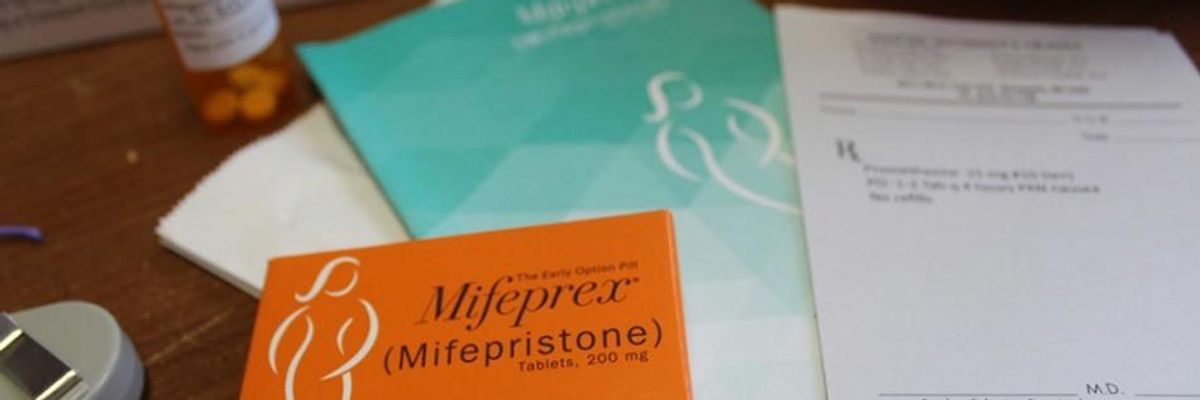Healthcare providers, reproductive rights advocates, and progressive politicians are not only celebrating the U.S. Food and Drug Administration's decision this week to lift a restriction on accessing abortion medication during the coronavirus pandemic but also calling on regulators to retain the policy after the public health crisis is over.
"Medication abortion just became more accessible during the pandemic," NARAL Pro-Choice America tweeted Wednesday. "Now, we need to make the change permanent."
"We look forward to working with policymakers to ensure this principle governs post-pandemic care."
--Dr. Maureen G. Phipps, ACOG
In a statement, NARAL chief campaigns and advocacy officer Christian LoBue said that "the in-person dispensing restriction--which the Trump administration fought to keep in place during the pandemic--prioritized ideology over science and endangered the health and well-being of Americans."
"The unfortunate reality is that medication abortion care remains out of reach for many due to additional medically unnecessary and ideologically motivated restrictions," LoBue continued. "We must ensure that people can access the care that they need even after the pandemic ends."
LoBue added that "we are hopeful that the Biden administration will take further action to remedy this through a comprehensive FDA review of all restrictions on medication abortion--bringing us closer to a world where we all have the freedom to make our own decisions about our lives, our bodies, and our futures."
A medication or medical abortion is one way to complete an early miscarriage or end a pregnancy, and commonly involves two drugs--mifepristone and misoprostol--taken orally. The FDA requires that mifepristone "only be dispensed in clinics, medical offices, and hospitals by or under the supervision of a certified healthcare provider." The patient can then take the medication at a time and place they choose.
Though healthcare experts and advocates have long opposed the dispensing restriction as an unnecessary barrier to abortion care, and argued for a permanent policy change, that call gained new weight during the Covid-19 crisis.
Last year, a federal court ruled that the FDA must temporarily suspend enforcement of the restriction and allow patients to receive mifepristone by mail. However, the Trump administration fought back, and the right-wing U.S. Supreme Court reinstated the in-person pickup rule in January, just days before President Joe Biden took office.
In March, reproductive rights, health, and justice groups sent petitions and a letter urging the Biden administration to lift the dispensing restriction. Acting FDA Commissioner Dr. Janet Woodcock responded Monday with a letter (pdf) to the American College of Obstetricians and Gynecologists (ACOG) and Society for Maternal-Fetal Medicine.
The FDA "conducted a literature search for studies pertinent to the in-person dispensing requirement," Woodcock wrote. "The overall findings from these studies do not appear to show increases in serious safety concerns (such as hemorrhage, ectopic pregnancy, or surgical interventions) occurring with medical abortion as a result of modifying the in-person dispensing requirement during the Covid-19 pandemic."
Dr. Maureen G. Phipps, ACOG's CEO, applauded the agency "for acknowledging the strong safety and efficacy profile of mifepristone for termination of early pregnancy" and said that "by halting enforcement of the in-person dispensing requirement during the Covid-19 pandemic, the FDA is recognizing and responding to the available evidence--which has clearly and definitively demonstrated that the in-person dispensing requirement for mifepristone is unnecessary and restrictive."
"ACOG has for years advocated for the FDA to remove the in-person dispensing requirement for mifepristone, given that there is no safety reason for the restrictions and that the restrictions were more burdensome than those placed on medications with similar safety profiles, or even those with greater risks," she noted. "Requiring the medicine to be dispensed in person, then taken elsewhere at the patients' discretion, is arbitrary and does nothing to bolster the safety of an already-safe medicine."
While recognizing that the pandemic made the FDA's restriction "not just burdensome," but "also dangerous," Phipps vowed that ACOG will keep working to make the drug accessible in the long-term. "We are pleased to see mifepristone regulated on the basis of the scientific evidence during the pandemic, rather than political bias against comprehensive reproductive healthcare," she said, "and we look forward to working with policymakers to ensure this principle governs post-pandemic care."
The ACLU--which filed suit on behalf of ACOG and other organizations last May to block the FDA's policy during the pandemic and is currently challenging it more broadly in separate litigation--responded similarly.
"This important step will ensure that abortion and miscarriage patients will no longer be forced to unnecessarily risk exposure to a deadly virus in order to access time-sensitive, essential healthcare," said Georgeanne Usova, senior legislative counsel at the ACLU. "But we cannot stop here."
"The restrictions on medication abortion are outdated and have obstructed patients' access for far too long," she said. "We urge the FDA to comprehensively evaluate them to ensure that patients can get the care they need without medically unnecessary, harmful obstacles--even after the pandemic ends."




